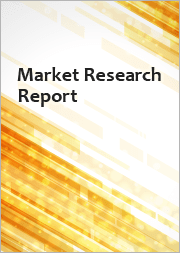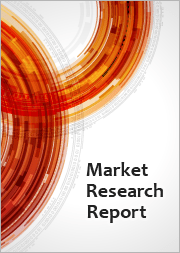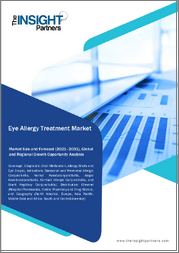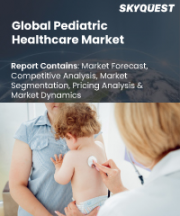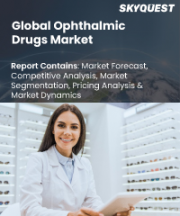
|
시장보고서
상품코드
1803013
자작나무 알레르기 시장 예측(-2032년) - 제품별, 치료 유형별, 유통 채널별, 최종 사용자별, 지역별 분석Birch Allergy Market Forecasts to 2032 - Global Analysis By Product (Tablets, Eye Drops, Nasal Sprays, Injections and Other Products), Treatment Type, Distribution Channel, End User and By Geography |
||||||
Stratistics MRC에 따르면 세계의 자작나무 알레르기 시장은 2025년에 4억 5,270만 달러로 추정되고, 예측 기간 동안 CAGR 7.6%로 성장할 전망이며, 2032년에는 7억 5,590만 달러에 달할 것으로 예측됩니다.
자작나무 알레르기는 자작나무 나무에서 비산하는 꽃가루에 대한 면역계 반응이며 일반적으로 봄에 발생합니다. 재채기, 코 막힘, 눈 가려움, 인후 염증과 같은 알레르기성 비염 증상을 유발합니다. 민감한 사람은 면역계가 자작나무 꽃가루 단백질을 해로운 것으로 오인하고 염증을 일으키는 항체를 생산합니다. 자작나무 알레르기는 종종 구강 알레르기 증후군(OAS)과 관련이 있으며, 특정 과일, 야채 및 견과류가 자작나무 꽃가루 단백질과의 교차 반응에 의해 입과 목의 불편함을 유발합니다. 온대 지역에 많은 항히스타민 약물, 알레르겐 회피, 장기 증상 완화를 위한 면역 요법으로 관리할 수 있습니다.
시장 조사 보고서에 따르면, 미국은 자작나무 알레르기의 가장 큰 환자층이며, 치료의 최대 시장이기도 합니다.
자작나무 꽃가루 알레르기 유병률 상승
자작나무 꽃가루 알레르기의 유병률 증가는 자작나무 알레르기 시장의 현저한 성장을 가속하고 고급 진단, 면역 요법 및 개인화 치료 옵션에 대한 수요를 촉진합니다. 인지도의 향상 및 조기 발견에 의해 제약 및 바이오테크놀러지 분야의 기술 혁신이 가속화되고 있습니다. 이 급증은 또한 알레르겐 특이적 제품에 대한 전략적 투자를 촉구하고 목표 치료에 대한 접근을 확대하고 있습니다. 계절성 알레르기의 이환율이 세계적으로 상승하는 가운데, 시장은 지속적인 확대를 하고, 환자의 결과를 바꾸며, 알레르기 관리의 방식을 재구축하는 태세가 갖추어지고 있습니다.
고급 치료제의 높은 비용
고급 치료제의 고가의 비용은 자작나무 알레르기 시장의 큰 방해가 되어 환자의 접근과 도입률을 제한하고 있습니다. 알레르겐 특이적 면역요법을 비롯한 많은 혁신적인 치료법은 비용이 많이 들기 때문에 인구의 대부분은 손이 닿지 않습니다. 이러한 경제적 장벽은 전반적인 치료 도입률을 낮추고 시장 성장을 둔화시키며 치료 격차를 창출합니다. 그 결과, 비용과 관련된 과제는 진보된 자작나무 알레르기 치료의 보급과 이용을 계속 억제하고 있습니다.
의료 의식 향상 및 진단 기술
의료에 대한 의식 증가 및 진단법의 진보가 자작나무 알레르기 시장의 성장을 가속하고 있습니다. 알레르기 질환에 대한 일반 시민의 이해 증가는 조기 검사와 적극적인 관리를 촉진하고 분자진단의 혁신은 자작나무 특정 알레르겐의 정확한 식별을 가능하게 합니다. 이것은 알레르기 전문의가 면역 요법을 사용자 정의할 수 있게 하고 환자의 결과를 향상시킵니다. 세계적으로, 특히 도시와 신흥 지역에서 인식이 넓어짐에 따라, 적극적인 치료와 알레르기 친화적인 제품에 대한 수요가 급증하고 있으며, 역동적이고 환자 중심 시장은 큰 성장 가능성을 지니고 있습니다.
규제상의 장애물 및 단편화
규제 장애물 및 시장 단편화는 일관성이 없는 기준을 만들어 제품 승인까지의 기간을 장기화하고 제조업체의 컴플라이언스 비용을 증가시켜 자작나무 알레르기 시장에 악영향을 미칩니다. 지역 간의 분단은 통일된 치료 프로토콜과 시장 접근을 제한하고 혁신적인 치료법의 확장성을 제한합니다. 이러한 규제 조화의 부족은 투자를 억제하고, 진보된 진단 및 치료 솔루션의 도입을 지연시키며, 궁극적으로 시장 성장 및 자작나무 알레르기의 효과적인 관리 옵션에 대한 환자의 접근을 방해합니다.
COVID-19의 영향
COVID-19의 대유행은 자작나무 알레르기 시장에 다양한 영향을 미쳤습니다. 야외에서의 외출이 제한되어 꽃가루로 인한 알레르기 반응이 일시적으로 감소했습니다. 그러나 의료 서비스가 중단되었기 때문에 알레르기 검사와 면역 요법 치료가 지연되었습니다. 호흡기 시스템의 건강에 대한 관심 증가는 알레르기 관리에 대한 인식을 높이고 전자상거래의 성장은 OTC 항히스타민 약물과 알레르기 완화 제품의 판매를 지원했습니다. 팬데믹 후, 환자의 진찰이 증가하고 치료가 재개된 것이 시장 회복 및 장기 성장의 원동력이 되었습니다.
예측 기간 동안 부신 피질 스테로이드 약물 부문이 최대가 될 것으로 예상
코르티코 스테로이드 분야는 효과적인 증상 완화 및 환자의 충격 향상으로 예측 기간 동안 최대 시장 점유율을 차지할 것으로 예측됩니다. 그 항염증 특성은 중등도에서 심한 알레르기 반응을 관리하는 데 도움이 되고 의료 부담을 줄이며 QOL을 향상시킵니다. 의식 증가와 비강 내 스프레이 및 흡입기와 같은 제형의 개선으로 부신 피질 스테로이드가 선호되는 치료 옵션이 되고 있습니다. 이 부문의 확대는 혁신을 촉진하고 시장 가치를 높이고 목표로 삼은 장기적인 알레르기 관리 솔루션으로의 전환을 강화하고 있습니다.
예측 기간 동안 면역요법 분야의 CAGR이 가장 높아질 전망
면역요법은 단순히 증상을 완화하는 것이 아니라 근본 원인에 대처하는 장기적인 표적 치료를 제공하기 때문에 예측 기간 동안 면역요법 분야가 가장 높은 성장률을 보일 것으로 예측됩니다. 피하 면역 요법과 설하 면역 요법의 채용이 증가하고 환자의 컴플라이언스와 치료 성적이 향상되고 있다는 것이 수요를 밀어 올리고 있습니다. 알레르겐 특이적 제형의 진보와 함께, 면역요법의 지속적인 베네핏에 대한 환자와 의료 종사자의 의식 증가가 시장의 밑단을 넓히고 있습니다.
최대 점유율을 차지하는 지역
예측 기간 동안 진단 및 치료 옵션의 발전으로 아시아태평양이 가장 큰 시장 점유율을 차지할 것으로 예측됩니다. 도시화의 진전, 환경 조건의 변화, 꽃가루에 노출되는 기회 증가가 유병률의 상승으로 이어져, 효과적인 관리 솔루션에 대한 수요가 높아지고 있습니다. 정부의 이니셔티브, 의료 인프라 개선, 첨단 면역 요법 치료의 가용성은 시장 확대를 더욱 강화하고 있습니다. 또한, 환자 교육의 향상과 적극적인 의료 진찰 행동이 지역 전체의 보급률을 밀어 올리고 있습니다.
CAGR이 가장 높은 지역 :
예측 기간 동안 북미는 가장 높은 CAGR을 나타낼 것으로 예측됩니다. 이는 인지도 향상, 조기 진단, SLIT 정제 및 생물학적 제제와 같은 고급 면역 요법의 채용으로 인한 것입니다. 꽃가루 비산 시기의 장기화 및 알레르기성 비염 환자 증가에 따라 효과적인 치료에 대한 수요가 급증하고 있습니다. 전략적 연구개발 및 디지털 헬스툴은 환자의 결과를 향상시키고 의료 인프라 개선은 시장 확대를 지원합니다. 이러한 성장은 기술 혁신을 촉진하고 생명 공학 기업에 힘을 주고 맞춤형 의료를 추진하며 북미를 알레르기 관리의 리더로 자리매김하고 있습니다.
무료 맞춤형 서비스
이 보고서를 구독하는 고객은 다음 무료 맞춤설정 옵션 중 하나를 사용할 수 있습니다.
- 기업 프로파일
- 추가 기업의 종합적 프로파일링(3개사까지)
- 주요 기업의 SWOT 분석(3개사까지)
- 지역 구분
- 고객의 관심에 응한 주요국 시장 추계, 예측 및 CAGR(주 : 타당성 확인에 따름)
- 경쟁 벤치마킹
- 제품 포트폴리오, 지리적 존재, 전략적 제휴에 기반한 주요 기업 벤치마킹
목차
제1장 주요 요약
제2장 서론
- 개요
- 이해관계자
- 분석 범위
- 분석 방법
- 데이터 마이닝
- 데이터 분석
- 데이터 검증
- 분석 접근
- 분석 자료
- 1차 조사 자료
- 2차 조사 정보원
- 전제조건
제3장 시장 동향 분석
- 성장 촉진요인
- 성장 억제요인
- 시장 기회
- 위협
- 제품 분석
- 최종 사용자 분석
- 신흥 시장
- 신형 코로나 바이러스 감염(COVID-19)의 영향
제4장 Porter's Five Forces 분석
- 공급자의 협상력
- 바이어의 협상력
- 대체 제품의 위협
- 신규 진출기업의 위협
- 기업간 경쟁
제5장 세계의 자작나무 알레르기 시장 : 제품별
- 정제
- 안약
- 비강용 스프레이
- 주사
- 기타 제품
제6장 세계의 자작나무 알레르기 시장 : 치료 유형별
- 항히스타민제
- 면역요법
- 코 막힘 해소 약
- 코르티코 스테로이드
- 기타 치료의 유형
제7장 세계의 자작나무 알레르기 시장 : 유통 채널별
- 병원 약국
- 소매 약국
- 온라인 약국
- 기타 유통 채널
제8장 세계의 자작나무 알레르기 시장 : 최종 사용자별
- 병원
- 홈케어
- 클리닉
- 기타 최종 사용자
제9장 세계의 자작나무 알레르기 시장 : 지역별
- 북미
- 미국
- 캐나다
- 멕시코
- 유럽
- 독일
- 영국
- 이탈리아
- 프랑스
- 스페인
- 기타 유럽
- 아시아태평양
- 일본
- 중국
- 인도
- 호주
- 뉴질랜드
- 한국
- 기타 아시아태평양
- 남미
- 아르헨티나
- 브라질
- 칠레
- 기타 남미
- 중동 및 아프리카
- 사우디아라비아
- 아랍에미리트(UAE)
- 카타르
- 남아프리카
- 기타 중동 및 아프리카
제10장 주요 동향
- 계약, 사업 제휴 및 협력, 합작 사업
- 기업 합병 및 인수(M&A)
- 신제품 발매
- 사업 확장
- 기타 주요 전략
제11장 기업 프로파일링
- Allergy Therapeutics Plc
- Regeneron Pharmaceuticals Inc.
- Desentum
- HAL Allergy Group
- Roxall Medizin GmbH
- Worg Pharmaceuticals AG
- S-TARget therapeutics GmbH
- Adamis Pharmaceuticals Corporation
- Merck KGaA
- Stallergenes Greer plc
- ALK-Abello A/S
- Anergis SA
- Biomay AG
- Laboratorios LETI SL
- Bayer AG
- Johnson & Johnson
- Sanofi SA
- GlaxoSmithKline plc
- Teva Pharmaceutical Industries Ltd.
- Roche
According to Stratistics MRC, the Global Birch Allergy Market is accounted for $452.7 million in 2025 and is expected to reach $755.9 million by 2032 growing at a CAGR of 7.6% during the forecast period. Birch allergy is an immune system reaction to pollen released by birch trees, commonly occurring in spring. It triggers allergic rhinitis symptoms such as sneezing, nasal congestion, itchy eyes, and throat irritation. In sensitized individuals, the immune system mistakenly identifies birch pollen proteins as harmful, producing antibodies that cause inflammation. Birch allergy is often linked to oral allergy syndrome (OAS), where certain fruits, vegetables, or nuts cause mouth or throat discomfort due to cross-reactivity with birch pollen proteins. It is prevalent in temperate regions and can be managed through antihistamines, allergen avoidance, and immunotherapy for long-term symptom relief.
According to the market research reports, the United States has the largest patient pool for birch allergy and also represents the largest market for its treatment.
Market Dynamics:
Driver:
Rising Prevalence of Birch Pollen Allergies
The rising prevalence of birch pollen allergies is driving significant growth in the birch allergy market, fueling demand for advanced diagnostics, immunotherapies, and personalized treatment options. Increased awareness and earlier detection are accelerating innovation across pharmaceutical and biotech sectors. This surge is also prompting strategic investments in allergen-specific products and expanding access to targeted care. As seasonal allergy rates climb globally, the market is poised for sustained expansion, transforming patient outcomes and reshaping allergy management landscapes.
Restraint:
High Cost of Advanced Therapies
The high cost of advanced therapies significantly hinders the Birch Allergy Market, limiting patient accessibility and adoption rates. Many innovative treatment options, such as allergen-specific immunotherapies, involve substantial expenses, making them unaffordable for a large segment of the population. This financial barrier reduces overall treatment uptake, slows market growth, and creates disparities in care. Consequently, cost-related challenges continue to impede the widespread availability and utilization of advanced birch allergy treatments.
Opportunity:
Growing Healthcare Awareness & Diagnostics
Rising healthcare awareness and advancements in diagnostics are catalyzing growth in the birch allergy market. Increased public understanding of allergic conditions is driving early testing and proactive management, while innovations in molecular diagnostics enable precise identification of birch-specific allergens. This empowers allergists to tailor immunotherapy and enhances patient outcomes. As awareness spreads globally, especially in urban and emerging regions, demand for targeted treatments and allergy-friendly products is surging-creating a dynamic, patient-centric market with strong growth potential.
Threat:
Regulatory Hurdles & Fragmentation
Regulatory hurdles and market fragmentation negatively impact the birch allergy market by creating inconsistent standards, prolonging product approval timelines, and increasing compliance costs for manufacturers. Fragmentation across regions limits uniform treatment protocols and market access, restricting the scalability of innovative therapies. This lack of regulatory harmonization discourages investment and slows the introduction of advanced diagnostic and treatment solutions, ultimately hindering market growth and patient access to effective birch allergy management options.
Covid-19 Impact
The Covid-19 pandemic had a mixed impact on the birch allergy market. Reduced outdoor exposure during lockdowns temporarily lowered pollen-related allergic reactions. However, disrupted healthcare services delayed allergy testing and immunotherapy treatments. Increased focus on respiratory health boosted awareness of allergy management, while e-commerce growth supported sales of OTC antihistamines and allergy relief products. Post-pandemic, rising patient visits and resumed treatments are driving market recovery and long-term growth.
The corticosteroids segment is expected to be the largest during the forecast period
The corticosteroids segment is expected to account for the largest market share during the forecast period, due to effective symptom relief and improving patient adherence. Their anti-inflammatory properties help manage moderate to severe allergic reactions, reducing healthcare burden and enhancing quality of life. With rising awareness and improved formulations-such as intranasal sprays and inhalers-corticosteroids are becoming a preferred treatment option. This segment's expansion is catalyzing innovation, boosting market value, and reinforcing the shift toward targeted, long-term allergy management solutions.
The immunotherapy segment is expected to have the highest CAGR during the forecast period
Over the forecast period, the immunotherapy segment is predicted to witness the highest growth rate, as it offers long-term, targeted treatment that addresses the root cause rather than just alleviating symptoms. Increasing adoption of subcutaneous and sublingual immunotherapy is enhancing patient compliance and treatment outcomes, thereby boosting demand. Growing awareness among patients and healthcare providers about the lasting benefits of immunotherapy, coupled with advancements in allergen-specific formulations, is expanding market reach.
Region with largest share:
During the forecast period, the Asia Pacific region is expected to hold the largest market share due to advancements in diagnostic and treatment options. Rising urbanization, changing environmental conditions, and growing exposure to pollen are leading to higher prevalence rates, prompting greater demand for effective management solutions. Government initiatives, improved healthcare infrastructure, and the availability of advanced immunotherapy treatments are further supporting market expansion. Additionally, increasing patient education and proactive healthcare-seeking behavior are boosting adoption rates across the region.
Region with highest CAGR:
Over the forecast period, the North America region is anticipated to exhibit the highest CAGR, owing to rising awareness, early diagnosis, and adoption of advanced immunotherapies like SLIT tablets and biologics. With longer pollen seasons and increasing allergic rhinitis cases, demand for effective treatments is surging. Strategic R&D and digital health tools are enhancing patient outcomes, while improved healthcare infrastructure supports market expansion. This growth fosters innovation, empowers biotech players, and promotes personalized medicine, positioning North America as a leader in allergy management.
Key players in the market
Some of the key players profiled in the Birch Allergy Market include Allergy Therapeutics Plc, Regeneron Pharmaceuticals Inc., Desentum, HAL Allergy Group, Roxall Medizin GmbH, Worg Pharmaceuticals AG, S-TARget therapeutics GmbH, Adamis Pharmaceuticals Corporation, Merck KGaA, Stallergenes Greer plc, ALK-Abello A/S, Anergis SA, Biomay AG, Laboratorios LETI SL, Bayer AG, Johnson & Johnson, Sanofi S.A., GlaxoSmithKline plc, Teva Pharmaceutical Industries Ltd. and Roche.
Key Developments:
In May 2025, Johnson & Johnson MedTech has joined forces with Qure.ai under Project BreatheEZ to roll out AI-powered Incidental Pulmonary Nodule detection clinics-10 hubs and 20 spokes-across India, beginning with Thangam Cancer Centre, aiming to catch lung cancer at its most treatable stage.
In March 2025, Roche unveiled an exclusive collaboration with Zealand Pharma to co-develop and co-commercialize petrelintide, a long-acting amylin analog-alone or paired with Roche's dual GLP-1/GIP agonist CT-388-to elevate care in cardiovascular, renal, and metabolic diseases.
Products Covered:
- Tablets
- Eye Drops
- Nasal Sprays
- Injections
- Other Products
Treatment Types Covered:
- Antihistamines
- Immunotherapy
- Decongestants
- Corticosteroids
- Other Treatment Types
Distribution Channels Covered:
- Hospital Pharmacies
- Retail Pharmacies
- Online Pharmacies
- Other Distribution Channels
End Users Covered:
- Hospitals
- Homecare
- Clinics
- Other End Users
Regions Covered:
- North America
- US
- Canada
- Mexico
- Europe
- Germany
- UK
- Italy
- France
- Spain
- Rest of Europe
- Asia Pacific
- Japan
- China
- India
- Australia
- New Zealand
- South Korea
- Rest of Asia Pacific
- South America
- Argentina
- Brazil
- Chile
- Rest of South America
- Middle East & Africa
- Saudi Arabia
- UAE
- Qatar
- South Africa
- Rest of Middle East & Africa
What our report offers:
- Market share assessments for the regional and country-level segments
- Strategic recommendations for the new entrants
- Covers Market data for the years 2024, 2025, 2026, 2028, and 2032
- Market Trends (Drivers, Constraints, Opportunities, Threats, Challenges, Investment Opportunities, and recommendations)
- Strategic recommendations in key business segments based on the market estimations
- Competitive landscaping mapping the key common trends
- Company profiling with detailed strategies, financials, and recent developments
- Supply chain trends mapping the latest technological advancements
Free Customization Offerings:
All the customers of this report will be entitled to receive one of the following free customization options:
- Company Profiling
- Comprehensive profiling of additional market players (up to 3)
- SWOT Analysis of key players (up to 3)
- Regional Segmentation
- Market estimations, Forecasts and CAGR of any prominent country as per the client's interest (Note: Depends on feasibility check)
- Competitive Benchmarking
- Benchmarking of key players based on product portfolio, geographical presence, and strategic alliances
Table of Contents
1 Executive Summary
2 Preface
- 2.1 Abstract
- 2.2 Stake Holders
- 2.3 Research Scope
- 2.4 Research Methodology
- 2.4.1 Data Mining
- 2.4.2 Data Analysis
- 2.4.3 Data Validation
- 2.4.4 Research Approach
- 2.5 Research Sources
- 2.5.1 Primary Research Sources
- 2.5.2 Secondary Research Sources
- 2.5.3 Assumptions
3 Market Trend Analysis
- 3.1 Introduction
- 3.2 Drivers
- 3.3 Restraints
- 3.4 Opportunities
- 3.5 Threats
- 3.6 Product Analysis
- 3.7 End User Analysis
- 3.8 Emerging Markets
- 3.9 Impact of Covid-19
4 Porters Five Force Analysis
- 4.1 Bargaining power of suppliers
- 4.2 Bargaining power of buyers
- 4.3 Threat of substitutes
- 4.4 Threat of new entrants
- 4.5 Competitive rivalry
5 Global Birch Allergy Market, By Product
- 5.1 Introduction
- 5.2 Tablets
- 5.3 Eye Drops
- 5.4 Nasal Sprays
- 5.5 Injections
- 5.6 Other Products
6 Global Birch Allergy Market, By Treatment Type
- 6.1 Introduction
- 6.2 Antihistamines
- 6.3 Immunotherapy
- 6.4 Decongestants
- 6.5 Corticosteroids
- 6.6 Other Treatment Types
7 Global Birch Allergy Market, By Distribution Channel
- 7.1 Introduction
- 7.2 Hospital Pharmacies
- 7.3 Retail Pharmacies
- 7.4 Online Pharmacies
- 7.5 Other Distribution Channels
8 Global Birch Allergy Market, By End User
- 8.1 Introduction
- 8.2 Hospitals
- 8.3 Homecare
- 8.4 Clinics
- 8.5 Other End Users
9 Global Birch Allergy Market, By Geography
- 9.1 Introduction
- 9.2 North America
- 9.2.1 US
- 9.2.2 Canada
- 9.2.3 Mexico
- 9.3 Europe
- 9.3.1 Germany
- 9.3.2 UK
- 9.3.3 Italy
- 9.3.4 France
- 9.3.5 Spain
- 9.3.6 Rest of Europe
- 9.4 Asia Pacific
- 9.4.1 Japan
- 9.4.2 China
- 9.4.3 India
- 9.4.4 Australia
- 9.4.5 New Zealand
- 9.4.6 South Korea
- 9.4.7 Rest of Asia Pacific
- 9.5 South America
- 9.5.1 Argentina
- 9.5.2 Brazil
- 9.5.3 Chile
- 9.5.4 Rest of South America
- 9.6 Middle East & Africa
- 9.6.1 Saudi Arabia
- 9.6.2 UAE
- 9.6.3 Qatar
- 9.6.4 South Africa
- 9.6.5 Rest of Middle East & Africa
10 Key Developments
- 10.1 Agreements, Partnerships, Collaborations and Joint Ventures
- 10.2 Acquisitions & Mergers
- 10.3 New Product Launch
- 10.4 Expansions
- 10.5 Other Key Strategies
11 Company Profiling
- 11.1 Allergy Therapeutics Plc
- 11.2 Regeneron Pharmaceuticals Inc.
- 11.3 Desentum
- 11.4 HAL Allergy Group
- 11.5 Roxall Medizin GmbH
- 11.6 Worg Pharmaceuticals AG
- 11.7 S-TARget therapeutics GmbH
- 11.8 Adamis Pharmaceuticals Corporation
- 11.9 Merck KGaA
- 11.10 Stallergenes Greer plc
- 11.11 ALK-Abello A/S
- 11.12 Anergis SA
- 11.13 Biomay AG
- 11.14 Laboratorios LETI SL
- 11.15 Bayer AG
- 11.16 Johnson & Johnson
- 11.17 Sanofi S.A.
- 11.18 GlaxoSmithKline plc
- 11.19 Teva Pharmaceutical Industries Ltd.
- 11.20 Roche






